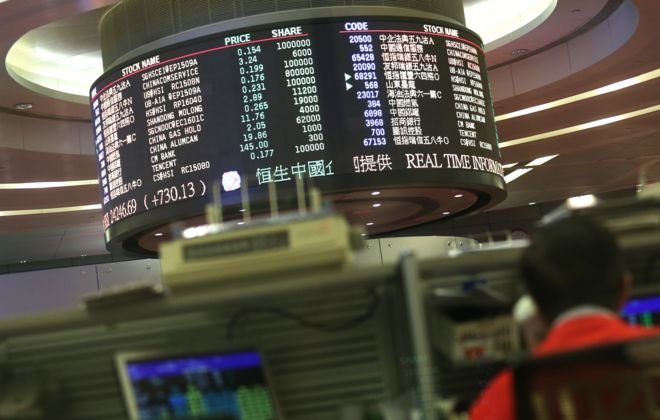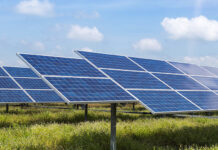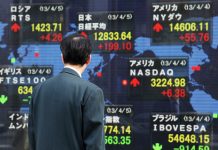
SINGAPORE: Asian markets were mostly lower on Monday after surveys showed a deterioration in the outlook for Chinese manufacturing ahead of the expected imposition of higher tariffs by Beijing and Washington starting Friday. Japan also reported weaker data. U.S. attempts to gain an upper hand in trade have also triggered retaliatory measures from the European Union and Canada.
KEEPING SCORE: Japan’s benchmark Nikkei 225 index lost 1.3 percent to 22,019.07 and South Korea’s Kospi shed 1.6 percent to 2,290.35. The Shanghai Composite index slipped 1.1 percent to 2,815.14 while Australia’s S&P/ASX 200 was flat at 6,196.20. Hong Kong’s Hang Seng was closed for a market holiday. Taiwan’s benchmark fell but Southeast Asian indexes were mixed.
WALL STREET: Major U.S. benchmarks finished mostly higher on Friday. The S&P 500 index rose 0.1 percent to 2,718.37 and the Dow Jones industrial average gained 0.2 percent to 24,271.41. The Nasdaq composite added 0.1 percent to 7,510.30. The Russell 2000 index of smaller-company stocks dropped 0.1 percent to close at 1,643.07 on Friday.
WEAK CHINESE DATA: China’s manufacturing activity slowed in June, adding to concerns that the economy is cooling due to tighter government controls on lending. The National Statistics Bureau’s purchasing managers’ index, which was released on Saturday, declined to 51.5 from May’s 51.9 on a 100-point scale. Numbers above 50 show acceleration. Exports, which support millions of manufacturing jobs, have shrunk as a share of China’s economy and contribute less than 1 percent of annual growth. On Monday, China’s Caixin Manufacturing PMI for June came in at 51.0, slightly lower than 51.1 in May.
U.S-CHINA TARIFFS: The U.S. is set to impose a 25 percent tariff on up to $50 billion of Chinese products starting this Friday. In response, China will raise import duties on $34 billion worth of American goods. On Sunday, Canada started billions of dollars in retaliatory tariffs against the U.S., in a tit-for-tat response to the Trump administration’s duties on Canadian steel and aluminum. The items include ketchup, lawn mowers and motor boats. Some items will be subject to taxes of 10 or 25 percent. The U.S. has also faced hit back from the European Union. Iconic American motorcycle maker Harley-Davidson will move some production overseas to avoid tariffs the European Union is placing on motorcycles made in the U.S.
JAPAN’S TANKAN: A central bank survey Monday showed Japan’s corporate outlook has worsened from three months ago, highlighting risks to its export-reliant economy from trade tensions. The Bank of Japan’s “tankan” survey measuring confidence among large-scale manufacturers was at 21 points, down 3 from the March survey, which was the first decline in two years. The manufacturers surveyed include automakers and electronics companies that are the mainstay of Japan’s economy.
ENERGY: Trump has claimed that Saudi Arabia will raise oil production by “maybe up to 2,000,000 barrels” in response to turmoil in Iran and Venezuela. This is higher than the 1 million barrels-a-day increase that OPEC countries have agreed on, sending oil futures on a decline. Benchmark U.S. crude fell 92 cents to $73.23 a barrel in electronic trading on the New York Mercantile Exchange. The contract gained 1 percent to $74.15 a barrel in New York on Friday. Brent crude, used to price international oils, fell $1.04 to $78.19 in London.
CURRENCIES: The dollar rose to 110.79 yen from 110.74 yen in late trading Friday. The euro weakened to $1.1656 from $1.1695.





















